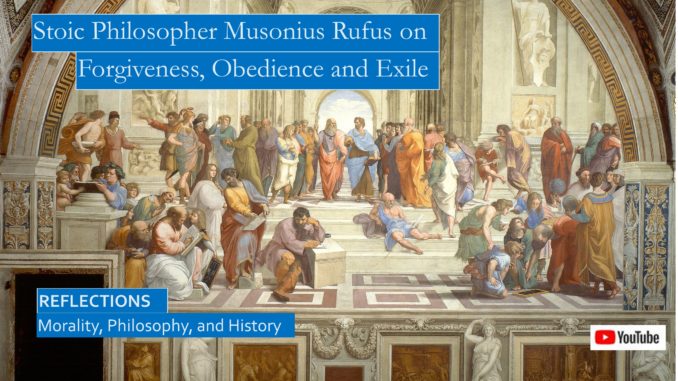
Exile was common to leading citizens who were out of favor politically in ancient Greece. At a certain time of the year the Assembly of all voting males could vote to ostracize a leading citizen, or send him into exile to a neighboring city-state. Sometimes this was done every few years, sometimes a generation would pass between ostracism votes. Those exiled would not lose their property, they could move back in five or ten or even twenty years, unless they were permanently exiled. They would live a life of leisure with aristocratic friends in neighboring city-states, and it was evidently not too hard to find a couch to sleep on for years at a time for who knows, those friends themselves may be exiled one day.
YouTube video for this blog: https://youtu.be/2Ft0YOjfbP8
YouTube script for more book links: https://www.slideshare.net/BruceStrom1/stoic-musonius-rufus-on-forgiveness-obedience-exile-and-living-a-philosophical-life
Today ordinary people often suffer from the rejection of types of exile who will find the advice of Rufus refreshing. When a man is served papers and is humiliated by being thrown out of his house by a vengeful divorcing spouse, is that not a form of exile? When someone whose work is suddenly picked at and criticized by a company that has employed him for decades, and who is unceremoniously shown to the door by security guards, is that not a form of exile? When a young person is hired by a large company or the military and is deliberately posted far from home and family, can that not be a form of exile? How much I am at fault for my rejection, for my exile, matters little, what matters is whether I can become a better person through my experiences, whether I be bitter or forbear and forgive, whether I lead a virtuous life.
Rufus asks, like a good stoic, Why should the exile lament of his condition, why should he complain, how is he oppressed? Has he been exiled from the warmth of sun, has he been exiled from being refreshed by the rain, has he been excluded from the society of men? Rufus adds that in exile we may associate with our friends, our true friends, those friends “who would never betray or abandon us,” but those who shun us are not true friends, we are better off without those who are not truly friends. The most important question Rufus asks is, “How can exile be an obstacle to the acquisition of virtue, when no one was ever hindered from the knowledge and practice of what is needful because of exile?”
Rufus has many examples from antiquity of exiles who improved their condition. Diogenes was transformed from an ordinary citizen to a philosopher; Dio of Syracuse was able to regain his wealth and recruit an army to overthrow the tyrant who exiled him; Themistocles, when banished from Athens, was appointed a regional governor by the Persian king, and lived out his life in abundance.
We can see many examples today of how people today can improve by exile. Often divorced men when they spend time with their young children can develop deeper bonds than they could have when mired in marital strife, mired in constant bitterness, anger, and resentment. Likewise, we all know of those who are not discouraged after being laid off from a less than ideal job and who drastically improve their career path.
Rufus dismisses those who insist that exiles are the worse off when they also lose their freedom of speech. Nonsense, Rufus says, for you never truly lose your freedom of speech, for nobody can ever take away your freedom of thought, and if you do not feel free to speak out against injustice or impiety, you are not limited by lack of freedom, you are reined back by FEAR. To the truly courageous who insist on speaking out, the truly courageous who fear neither pain nor punishment nor death, how can they lose their freedom? They are truly free.
We must truly be thankful of all our fortunes and misfortunes, for neither keeps us from seeking virtue, and both can aid us in our journey towards greater virtue, towards salvation, towards the working out of our salvation, for what else does working out our salvation mean, if it does not mean that we work out our salvation through both our blessings and our sufferings? Whether our sufferings are the consequences of our actions or are merely the blowback of injustices or wrongs forgotten or unforgotten of those who should love us, what does it matter?
Did Christ suffer and die on the cross so we do not have to? Christ would not be so timid as to cheat us out of our suffering.
How can I improve on Rufus’ closing thoughts? “Certainly the exile is not prevented from possessing courage and justice simply because he is banished, nor is he denied self-control, nor is he denied self-control, or any virtue that brings honor and benefit to the man with a good reputation and worthy of praise. . . If you are good, you will never be harmed or degraded by exile, for your virtues will help you and sustain you. But if you are bad, it is the evil that harms you and not exile, and the misery you feel in exile is the product of evil, not of exile.”[1]
[1] Musonius Rufus, translated by Cynthia King (published by www.CreateSpace.com, 2011), from Lectures, Book 9, pp. 44-49.

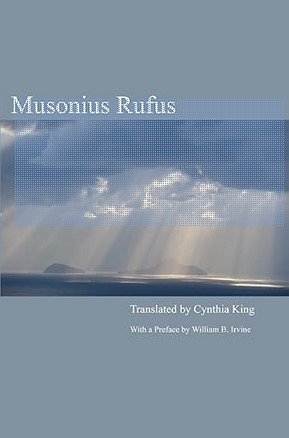
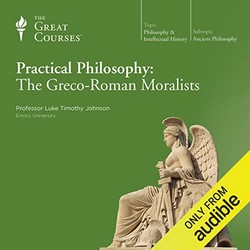
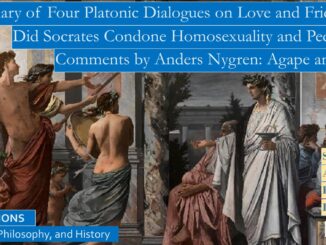
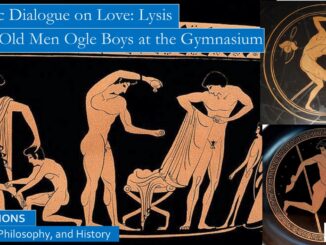
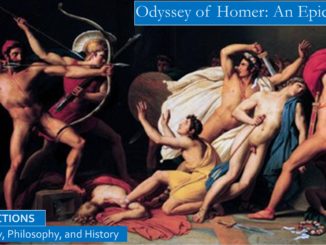
1 Trackback / Pingback